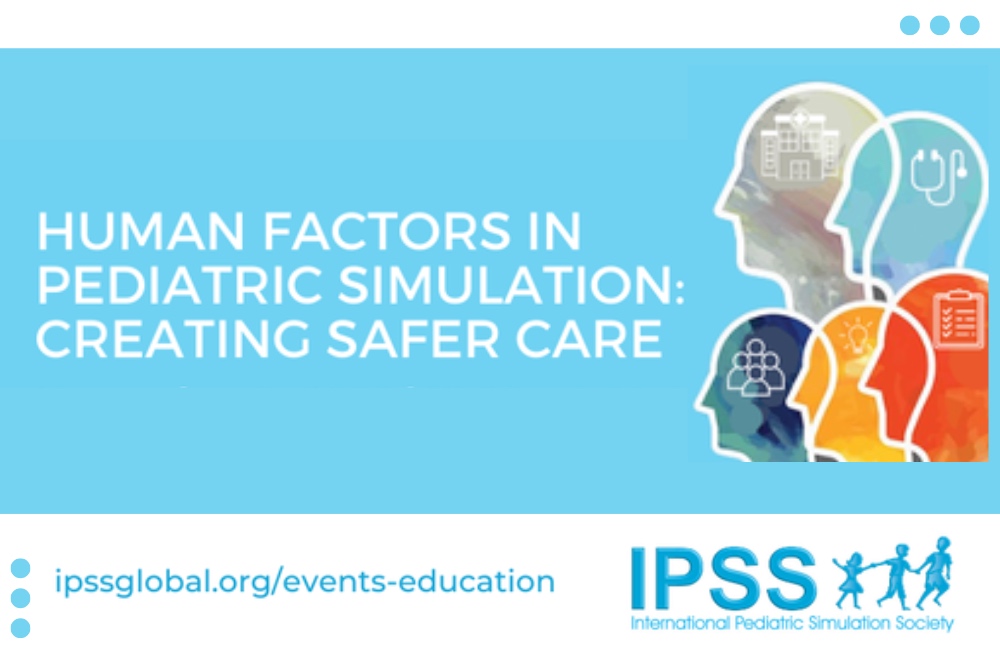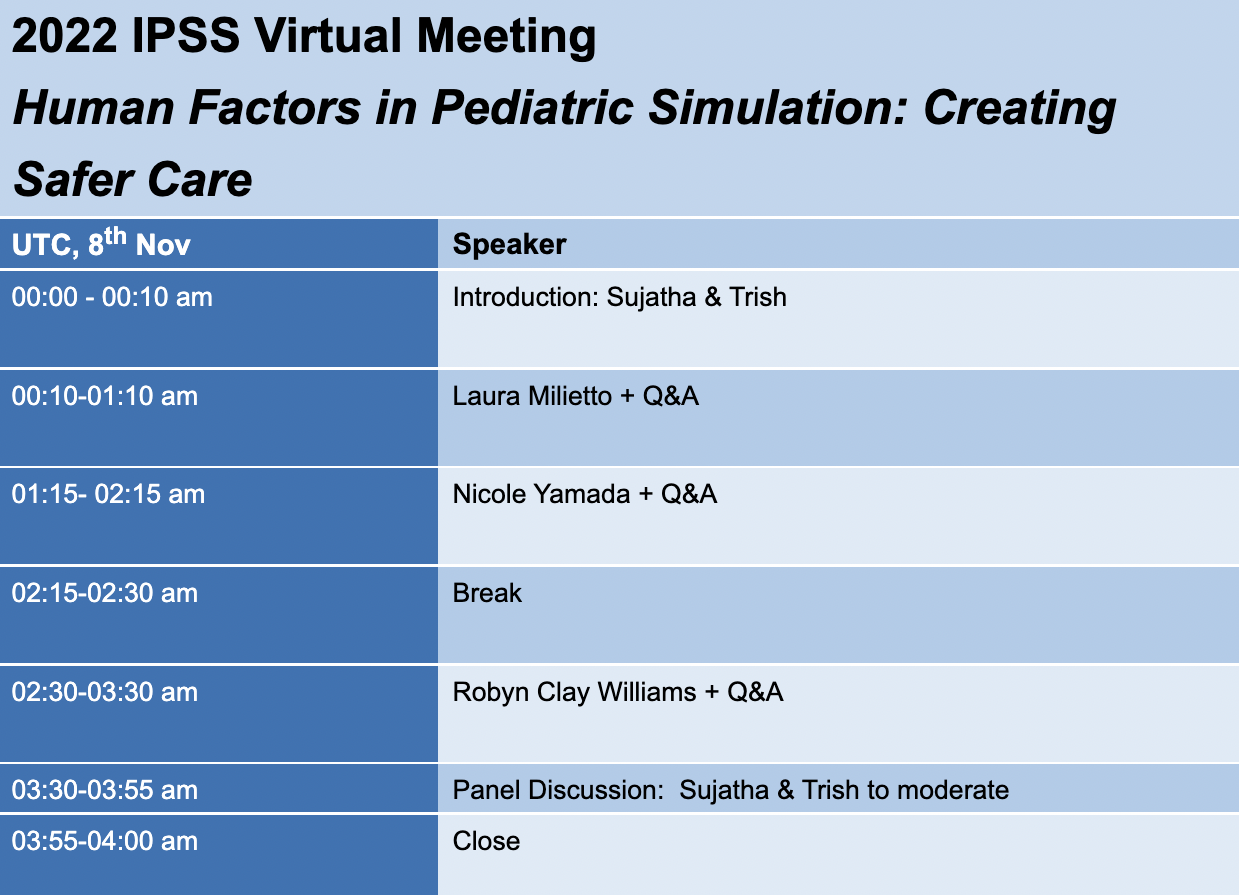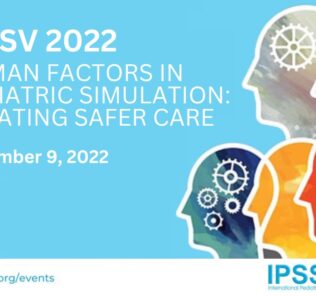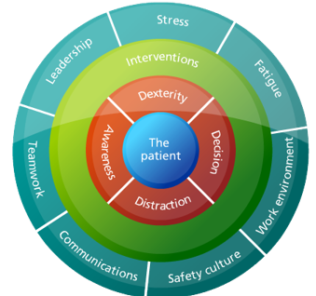IPSSV2022: Human Factors in Pediatric Simulation
Human factors can be integrated into healthcare simulation-based education to make the training experience even more realistic. This is true in the case of pediatric simulation, as learners may use this approach to gain a deeper understanding of design, systems, and processes that may later hamper them in their attempt to deliver the best care. To help these learners gain an even greater understanding of human factors and reshape their mindsets to better support the safety and quality care of children, the International Pediatric Simulation Society will host the organization’s IPSSV2022 “Human Factors in Pediatric Simulation: Creating Safer Care” event on November 9, 2022. This HealthySimulation.com article will preview the event and share what attendees can expect.
IPSSV2022 will be held virtually on Zoom. Attendees can join IPSS leadership and presenters live from around the world to learn and earn CE credits. Attending participants can expect to hear from expert keynote speakers. They will also have the chance to ask questions during the Q&A sessions.
Further, participants will be granted the opportunity to join in a panel discussion with the keynote speakers. All three keynotes are highly experienced in the field of human factors.
Sponsored Content:
“This symposium will provide a deeper understanding of human factors, reshape mindsets, and better support safety and quality care of children,” said
Taylor Sawyer, DO, MEd, CHSE-A, FAAP is a Neonatologist at the University of Washington Medical Center and Seattle Children’s Hospital. “When we apply a human factors approach to pediatric simulation, we refocus to gain a deeper understanding of design, systems, and processes that may hamper us in our attempt to deliver the best care. This event will bring together experts in the fields of simulation and human factors.”
IPSSV2022 Speakers
Laura Militello, MA: Laura Militello is a recognized leader in the Naturalistic Decision-Making community. She helped establish the Naturalistic Decision Making Association and is co-host of the Naturalistic Decision-Making podcast. She is the co-founder of two small businesses. Applied Decision Science, LLC is a research and development company that studies expertise in high-stakes environments. Unveil, LLC develops and delivers augmented reality training to combat medics as well as civilian emergency medical services. She co-authored (with Robert Hoffman) Perspectives on Cognitive Task Analysis (Taylor & Francis, 2009), a leading textbook on cognitive task analysis. She has been developing strategies to support people who make decisions under stress for over 30 years.
Robyn Clay-Williams BEng, Ph.D.: Associate Professor Robyn Clay-Williams is an internationally regarded health services researcher and a leading exponent of Resilient Health Care. Robyn leads a research stream at the Australian Institute of Health and Innovation, Macquarie University, in the field of human factors and resilience in health care. Her expertise is in creating health systems that can function effectively in the presence of complexity and uncertainty. Her research bridges the gap between theory and practice, by developing products and processes that are usable and ready for implementation. Robyn has published extensively, with over 110 peer-reviewed academic papers, books, and book chapters. Her 2019 TEDx talk on human factors is available on the global TED.com platform. Robyn has a background in aviation and, prior to her academic career, was a military test pilot with the Royal Australian Air Force.
Sponsored Content:
Nicole Yamada, MD, MS: Nicole Yamada, MD, MS is a Clinical Associate Professor in the Division of Neonatal and Developmental Medicine, Department of Pediatrics at Stanford University. She completed her medical training at Washington University in St. Louis, School of Medicine; residency training in Pediatrics at the University of California at San Diego; and fellowship training in Neonatal-Perinatal Medicine at Stanford University. She also has a Master of Science in Human Factors and Ergonomics from San Jose State University. She is certified by the American Board of Pediatrics in both general pediatric medicine and neonatal-perinatal medicine, and she is a Fellow of the American Academy of Pediatrics.
More About IPSS
The International Pediatric Simulation Society (IPSS) is a global community of pediatricians, pediatric subspecialists, pediatric nurses, educators, and other allied health professionals who are dedicated to improving the care of infants and children worldwide. They work to achieve this outcome through multi-disciplinary, simulation-based education, training, and research in pediatric simulation.
The Society strives to extend the knowledge and skills that participating members have gained to the widest possible audience. Extending membership and involvement to all healthcare professionals who care for children and infants, regardless of the geographic location where they practice, IPSS has become a global voice influencing worldwide childcare innovation, integration, and motivation.
Since the first IPSS meeting in Stockholm, Sweden in 2008, the year the society was founded by 11 multi-national pediatric medical practitioners, membership in the International Pediatric Simulation Society has grown immensely. Involving healthcare specialists from over 30 countries, the goal of the IPSS remains to promote multidisciplinary simulation in all healthcare subspecialties that treat infants and children. Further, the vision of IPSS is that children and families come to have the best healthcare opportunities possible.
Learn More About IPSSV2022
Lance Baily, BA, EMT-B, is the Founder / CEO of HealthySimulation.com, which he started in 2010 while serving as the Director of the Nevada System of Higher Education’s Clinical Simulation Center of Las Vegas. Lance also founded SimGHOSTS.org, the world’s only non-profit organization dedicated to supporting professionals operating healthcare simulation technologies. His co-edited Book: “Comprehensive Healthcare Simulation: Operations, Technology, and Innovative Practice” is cited as a key source for professional certification in the industry. Lance’s background also includes serving as a Simulation Technology Specialist for the LA Community College District, EMS fire fighting, Hollywood movie production, rescue diving, and global travel. He and his wife live with their two brilliant daughters and one crazy dachshund in Las Vegas, Nevada.
Sponsored Content:


















